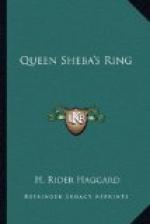“It may not be, O Tongue, for they would be worshippers of Harmac, and between Jehovah, whom I serve, and Harmac there is war,” she answered with spirit.
“Yes, sweet-smelling Bud of the Rose, there is war, and let it be admitted that the first battle has gone against Harmac, thanks to the magic of the white men. Yet yonder he sits in his glory as the spirits, his servants, fashioned him in the beginning,” and he pointed with his spear toward the valley of the idol. “You know our prophecy—that until Harmac rises from his seat and flies away, for where he goes, the Fung must follow—till then, I say, we shall hold the plains and the city of his name—that is, for ever.”
“For ever is a long word, O Mouth of Barung.” Then she paused a little, and added slowly, “Did not certain of the gates of Harmac fly far this morning? Now what if your god should follow his gates and those worshippers who went with them, and be seen no more? Or what if the earth should open and swallow him, so that he goes down to hell, whither you cannot follow? Or what if the mountains should fall together and bury him from your sight eternally. Or what if the lightnings should leap out and shatter him to dust?”
At these ominous words the envoys shivered, and it seemed to me that their faces for a moment turned grey.
“Then, O Child of Kings,” answered the spokesman solemnly, “the Fung will acknowledge that your god is greater than our god, and that our glory is departed.”
Thus he spoke and was silent, turning his eyes toward the third messenger, he who wore a cloth or napkin upon his head that was pierced with eyeholes and hung down to the breast. With a quick motion, the man dragged off this veil and threw it to the ground, revealing a very noble countenance, not black like that of his followers, but copper-coloured. He was about fifty years of age, with deep-set flashing eyes, hooked nose, and a flowing, grizzled beard. The collar of gold about his neck showed that his rank was high, but when we noticed a second ornament of gold, also upon his brow, we knew that it must be supreme. For this ornament was nothing less than the symbol of royalty, once worn by the ancient Pharaohs of Egypt, the double snakes of the uraeus bending forward as though to strike, which, as we had seen, rose also from the brow of the lion-headed sphinx of Harmac.
As he uncovered, his two companions leapt to the ground and prostrated themselves before him, crying, “Barung! Barung!” while all three of us Englishmen saluted, involuntarily, I think, and even the Child of Kings bowed.
The Sultan acknowledged our greetings by raising his spear. Then he spoke in a grave measured voice:




